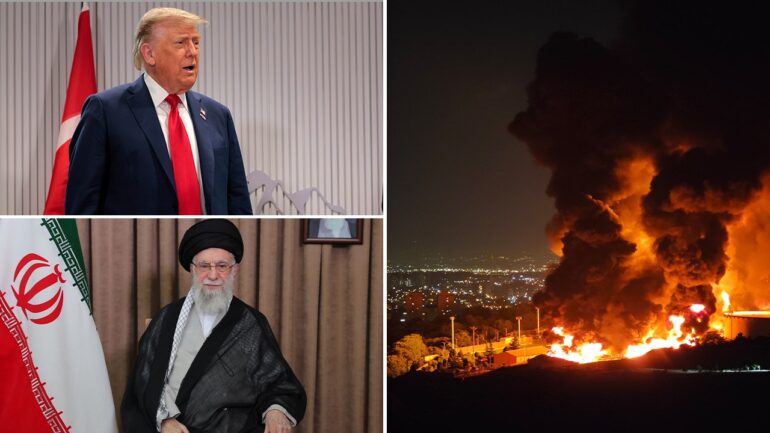The escalating conflict between Israel and Iran has the world on edge, with U.S. President Donald Trump’s ambiguous remarks adding fuel to the uncertainty. On June 18, 2025, during an event on the White House lawn, Trump addressed the possibility of U.S. military involvement in Israel’s ongoing strikes against Iran’s nuclear facilities. “I may do it, I may not do it. Nobody knows what I’m going to do,” he told reporters, refusing to clarify whether American forces would join the fray. This cryptic stance comes as Israel’s bombing campaign against Iran enters its sixth day, raising fears of a broader Middle East war.
A High-Stakes Standoff
The conflict intensified after Israel launched airstrikes targeting Iran’s nuclear program, including centrifuge production sites critical to uranium enrichment. Iran retaliated with ballistic missiles and drones, most of which were intercepted by Israel’s robust air defenses. According to the U.S.-based Human Rights Activists in Iran, at least 452 people have died in Iran since the strikes began, including 224 civilians. In Israel, Iranian missiles have killed at least 24 people, including 90-year-old Bella Ashkinaze, whose apartment near Tel Aviv was hit during a barrage.
Trump’s comments followed a provocative social media post where he demanded Iran’s “unconditional surrender” and hinted at U.S. control over Iranian airspace. He also claimed Iran had reached out for negotiations but said it was “too late,” asserting, “They’re totally defenseless. They have no air defense whatsoever.” Iran’s supreme leader, Ayatollah Ali Khamenei, rejected these claims, stating, “The Iranian nation cannot be surrendered,” and warned that U.S. intervention would lead to “irreparable damage.” Iran’s U.N. mission further denied seeking talks, accusing Trump of lying and threatening reciprocal action against any U.S. aggression.
Global and Domestic Reactions
The prospect of U.S. involvement has sparked division among Trump’s supporters. Hawkish Republicans, like Senator Ted Cruz, advocate for aggressive action against Iran, with Cruz stating, “We are carrying out military strikes today” alongside Israel. However, isolationist voices, such as media personality Tucker Carlson, warn against entangling the U.S. in another Middle East war. In a heated exchange, Carlson challenged Cruz’s knowledge of Iran, highlighting a rift within the “Make America Great Again” movement. Trump dismissed these concerns, insisting, “My supporters are more in love with me today.”
Internationally, mediators like Oman, where two Iranian government planes landed on June 18, are reportedly attempting to de-escalate tensions. Chinese Foreign Minister Wang Yi urged peaceful resolutions, opposing the use of force. Russian President Vladimir Putin offered to mediate but was rebuffed by Trump, who suggested Putin focus on Russia’s own conflicts.
Risks to U.S. Forces and Regional Stability
If the U.S. joins Israel’s campaign, over 40,000 American troops stationed across the Middle East, including in Iraq, Bahrain, Kuwait, and Qatar, could face immediate retaliation. Iranian officials have warned of missile strikes on U.S. bases, with some estimating missiles could hit targets in Gulf countries within minutes. The U.S. has bolstered regional defenses since Hamas’s October 2023 attack on Israel, but experts like Dana Stroul, a former Pentagon official, warn that Iran’s proxy militias in Iraq and elsewhere pose a significant threat.
Israel’s campaign reflects a bold shift in its military strategy, emboldened by the weakening of Iran’s allies, such as Hamas and Hezbollah, over the past 18 months. The fall of Syria’s Iran-backed government in December 2024 further tilted the regional balance in Israel’s favor. However, striking Iran’s deeply buried Fordo nuclear facility may require U.S. bunker-busting bombs, which Israel lacks, intensifying pressure on Trump to act.
Humanitarian and Diplomatic Fallout
The war has triggered a humanitarian crisis in Iran, with communication networks disrupted and thousands fleeing Tehran after Trump’s evacuation warning. In Israel, stranded tourists and citizens are being evacuated via special flights and cruise ships. The U.S. embassy in Jerusalem announced it is facilitating departures for American diplomats and citizens, underscoring the escalating risks.
As the world watches, Trump’s indecision keeps allies and adversaries guessing. His focus remains clear: “Iran cannot have a nuclear weapon.” Yet, with Iran vowing defiance and the U.S. military preparing for potential action—evidenced by tanker aircraft deployments to Europe—the risk of a wider conflict looms large. The coming days will be critical in determining whether diplomacy or escalation prevails.
